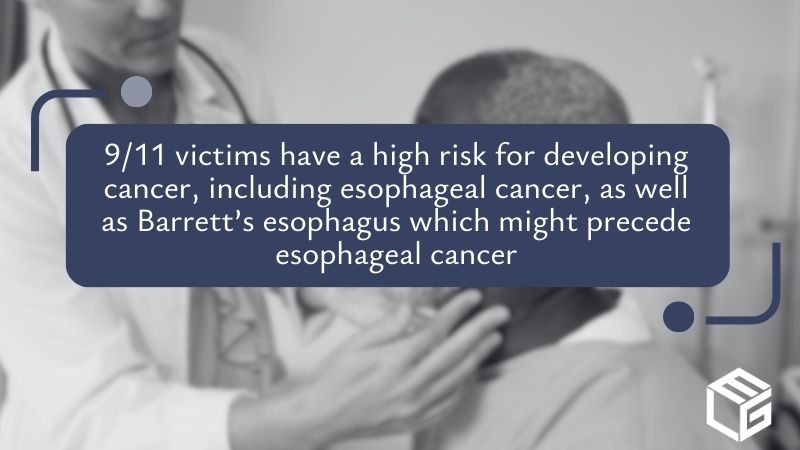-
About »
- Insulin MDL
-
Cases »
- Diseases
- Testimonials
- Government
- Contact
- Get Help Now
-

The toxic dust cloud released during the September 11th attacks exposed many New Yorkers to harmful substances, leading to various forms of cancer. Sadly, esophageal cancer, which affects the lining of the esophagus, was one of the cancers diagnosed in those who were at Ground Zero. If you were a 9/11 responder or survivor diagnosed with esophageal cancer, you may be eligible for financial compensation from the 9/11 Victim Compensation Fund. We can help you with the claim process.
Claim ApplicationThe tragic events of 9/11 unleashed a toxic cloud filled with harmful substances, including cancer-causing chemicals like asbestos, benzene, and polycyclic aromatic hydrocarbons. Recent research has revealed that first responders who were exposed to high levels of this toxic dust cloud experienced higher levels of cancer biomarkers.
Esophageal cancer occurs when cells lining the esophagus multiply uncontrollably. There are different types of esophageal cancer, each arising from specific cell types. Adenocarcinoma, the most common type in the United States, originates in the gland cells of the esophagus. Squamous cell carcinoma, on the other hand, develops in the flat cells lining the esophagus. Additionally, there are rarer forms of esophageal cancer as well. Individuals affected by 9/11-related esophageal cancer may experience the following symptoms:
If you were a first responder or were at the WTC attack site during or after the attacks and have since developed esophageal cancer, you might qualify for compensation. The 9/11 Victim Compensation Fund calculates payouts using a specific formula: non-economic loss + economic loss - collateral offset.
While the maximum payout is $250,000, you could receive more depending on the severity of your illness.
With over three decades of experience in handling toxic exposure cases, we understand the complexities of this process. Simply provide proof of your presence in the Exposure Zone and your medical records confirming your esophageal cancer diagnosis. We will carefully review your case to check your eligibility and work to secure the maximum compensation.